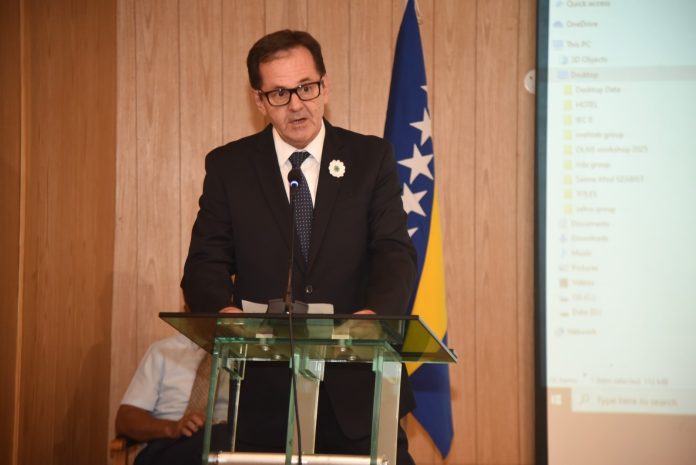Saifullah Ansar/DNA
Islamabad: In a deeply moving ceremony held to commemorate the International Day of Reflection and Commemoration of the 1995 Genocide in Srebrenica, the Ambassador of Bosnia and Herzegovina, Emin Cohodarevic delivered a powerful speech that resonated with solemnity, gratitude, and a renewed call for justice, remembrance, and global solidarity.
Addressing a distinguished gathering of diplomats, civil society members, scholars, and media representatives, Ambassador Emin began with a heartfelt greeting — “Good afternoon, Selamalejkum” — and expressed sincere appreciation for the guests’ presence in observing this solemn occasion.
“This year,” the Ambassador noted, “marks the 30th anniversary of the Srebrenica genocide, during which over 8,000 Bosnian Muslim men and boys were systematically murdered in what the United Nations has termed the worst atrocity on European soil since World War II.”
He recalled the broader context of the Bosnian War (1992–1995) — a period that witnessed more than 100,000 people killed, thousands of women subjected to sexual violence, and over two million people forcibly displaced. Amid such tragic memories, Ambassador Emin emphasized the importance of collective remembrance and moral vigilance.
“In our remembrance,” he said, “we reflect on what this anniversary means for today’s increasingly polarized world. We stand together against those who try to divide us and recommit ourselves to opposing hatred, discrimination, and prejudice. Only then can our communities and the world be safer, stronger, and more cohesive.”
A major point of gratitude in the Ambassador’s speech was directed toward the Government of Pakistan, which played a key role in the adoption of the UN General Assembly Resolution in May 2024, formally establishing July 11 as the International Day of Remembrance and Commemoration of the Srebrenica Genocide.
“The adopted resolution has planetary significance,” he remarked. “It is a moral, historical, and civilizational act. In times of complex global relations, it is important to know that the truth has its guardians.”
Ambassador Emin underscored the need to institutionally protect the legacy of the UN courts, condemn the glorification of war criminals, and promote a culture of peace and justice through education and dialogue.
In a poignant cultural tribute, the Ambassador also highlighted the screening of the internationally acclaimed film “Quo Vadis, Aida?” as part of the commemoration. Describing it as both a cinematic masterpiece and a harrowing reminder of the genocide, he invited the audience to contemplate its emotional and ethical questions.
“How many things would have been different if we had more empathy and solidarity?” he asked. “Did this tragedy have to have such a terrible outcome?”

















